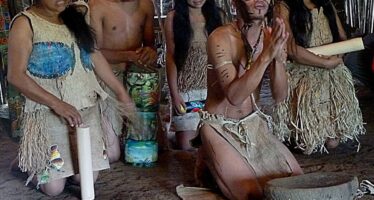Bahrain intensifies crackdown on activists and clerics
![]()
Amnesty International calls on the Bahraini authorities to reveal the whereabouts of eight human rights defenders, political activists and Shia clerics arrested in a clampdown by the authorities amid fears that they could be prisoners of conscience.
Muhammad Saeed, a board member of the banned Bahrain Centre for Human Rights was arrested at his home in Sehla, northern Bahrain, in the early hours of yesterday morning by security forces.
Two others, Abdulhadi al-Mokhoder and Mirza al-Mahrus, both clerics, were also arrested yesterday at their homes in Sanabis, and Manama, respectively.
“The Bahraini authorities must make it clear why these eight men have been arrested, and either release them or charge them with recognizable criminal offences. It is unacceptable for them to be held merely because of their human rights activism, non-violent political activities or criticism of the government,” said Hassiba Hadj Sahraoui, Deputy Director at Amnesty International’s Middle East and North Africa programme
“We are very concerned about the ongoing incommunicado detention of the detainees as this will increase their risk of being subjected to torture or other ill-treatment.”
The latest arrests mark an increased clampdown on opposition and civil society activists in the lead-up to the parliamentary elections in October 2010.
Jaafar Hisabi, a UK resident for the past 15 years who has been involved in political protests against the Bahraini authorities was arrested at Bahrain International Airport on his return to the country, on 16 August.
Three others were arrested on 15 August, including Abdulghani al-Khanjar, head of the Committee for the Defence of Martyrs and Torture Victims (which is not authorized by the Bahraini authorities to operate) and spokesperson of the Coalition for Truth and Reconciliation, who was arrested at his home in the town of Arrad.
Mohammad Habib al-Miqdad, a cleric and head of the Al-Zahra’ charity, was also arrested on 15 August at his home in Sehla, and Saeed al-Nouri, a cleric and activist from the opposition movement al-Wafa (which is also not authorized by the Bahraini authorities to operate) handed himself in to the Prosecutors Office in Manama, after security officials visited his home seeking his arrest.
Abdul Jalil al-Singaci, spokesperson for the Human Rights Bureau of the opposition movement Haq (which is not authorized by the Bahraini authorities to operate), who is disabled, was arrested at Bahrain International Airport on 13 August. His family told Amnesty International that they have not had any contact with him for the last six days and are concerned about this health.
Neither the families nor the legal representatives of the detainees have been informed of any formal charges.
“All of these detainees should be allowed to have immediate access to their lawyers, families and also to adequate medical care” said Hassiba Hadj Sahraoui
Some of the men have been detained in previous years in connection with their political or human rights activities. Muhammad Saeed was detained in November 2006, and Abdul Jalil Singaci and Muhammad Habib al-Miqdad were both previously detained in January 2009.
Many of the men have now been held for more than 48 hours without having been presented to the Public Prosecutor as required under the Bahraini law.
Bahrain’s Code of Criminal Procedure stipulates that detainees must be brought before the Public Prosecutor within 48 hours of arrest, but legal representatives have as yet been unable to obtain access to the detainees.
Related Articles
Bianet launched right to abortion campaign
![]()
A new anti-abortion law will be debated in the parliament in June 201, bianet launched right to abortion campaign A
Defining poverty
![]()
Measure by measure The world’s richest country tries to count its poor MOST people have an inherent sense of what
Costa Rica y pueblos indígenas: informe del Relator Especial de Naciones Unidas exhibe graves y persistentes lagunas
![]()
El pasado 28 de septiembre del 2022, se dió a conocer el informe realizado por el Relator Especial de Naciones Unidas sobre los Derechos de los Pueblos Indígenas, a raíz de su visita in situ en Costa Rica a finales del año 2021



